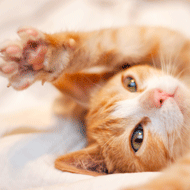Cat's colour rated important in choosing a pet

Ginger and tabby cats were perceived as being the most fun, while black cats were thought to be less friendly and playful.
The majority of people believe a cat's colour and appearance is important when choosing to adopt a new pet, according to a survey by Cats Protection.
Over 1,000 people were asked to share their perceptions of cats that were either black, ginger, tabby or tortoiseshell. Nearly three-quarters (73 per cent) said looks are at least 'somewhat important' when adopting a cat. And 69 per cent felt that colouring was at least 'somewhat important'.
When asked which three attributes would increase a cat's chance of being adopted, 34 per cent said their appearance, 32 per cent said their cuteness and 22 per cent their friendliness.
Ginger and tabby cats were also perceived as being the most fun, while black cats were thought to be less friendly and playful than their more colourful counterparts.
Cats Protection's national cat adoption centre manager Danielle Draper said: "It can be a real struggle to find homes for the black and black-and-white cats in our care, especially as they account for nearly half of the more than 5,000 cats that are in the charity’s care across the UK.
"These findings seem to suggest that people find black cats a little dull when compared with other colours. But the reality is that you really can’t predict what a cat’s temperament will be like based on the colour of its fur.
"Black cats are just as fun-loving, mischievous and playful as any other cat and have just as much to offer in terms of companionship."
The charity will hold its annual National Black Cat Day on 27 October to celebrate the black and black-and-white felines in its care, in the hope of inspiring more people to adopt them.



 The latest
The latest